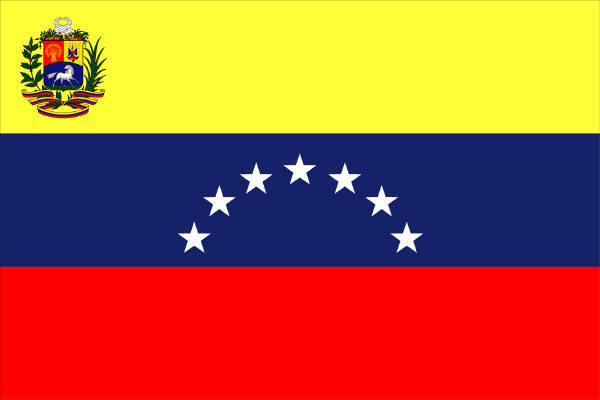
|
¡Venezuela! ¡Venezuela! ¿Where do we start? ¿What do we say? Do we talk about the country and its steady slide into the abyss (now late 2009). The crime, the corruption, the shortages, the surreally incompetent (and of course corrupt) government? Do we talk about marina life (or is that death) and the petty politicking and squabbling - a feature of any closed community, but here amplified into an implausible sitcom. Do we talk about the boatyard and quality (sic) of the work? |
| It's hard to decide because they're all so inter-related. Of course we could talk about the positive things and the good people we met, but where's the fun in that? No, seriously we will get on to the good stuff, but let's get the bad stuff off our chests first. | |
|
OK - The country. This might turn into a bit of a rant. It might contain stuff you're not interested in, or that you find hard to believe. In which case just scroll down the page to a bit you like more. Of course if you're a rabid Chavista it will all be evil capitalist propaganda and lies. I'll start by saying that before we arrived here we were sort of Chàvez fans. It always seemed such excellent value to us watching him wind up George Bush. However, it didn't take very long, actually living in Venezuela, to realise that the price of our amusement was too high to pay. First some facts. Venezuela is the wealthiest nation (per capita) in Latin America. Venezuela has the largest oil reserves in South America and if they ever work out how to refine the sludge in the Orinoco valley, in the world! It has an almost perfect climate, a fantastic eco system and a wonderful coast line. So it should be a paradise ¿No? Unfortunately, "No" is the right answer. |
|
|
10 years ago, before Chàvez came to power, Venezuela had one of the highest levels of financial inequality in Latin America (it was 4th). Now after 10 years of Chàvez's 21st century Bolivarian Socialist Revolution, the level of inequality is exactly the same (UN figures) - though the Chàvez family is now extremely wealthy and powerful. (Oh and by the way, just for the sake of historical accuracy, Simon Bolivar was not in any way a socialist!) For the average working Venezuelan family it now actually feels much worse than 10 years ago. In spite of successive increases in the minimum wage its buying power is much reduced (30-40% inflation) and even the governments own figures admit (in the small print) that an average family of 5 need two full-time workers in order to cover the cost of basic necessities. This hardly matters of course, because much of the time these basic necessities just aren't available. Coffee, sugar, milk, flour, meat, cheese are examples of these. Water and electricity are two others. There are a number of reasons for the shortages. A key one though, is that Venezuela produces virtually nothing apart from oil so a huge proportion of basic necessities are imported. Oil production has been falling at about 6% per year since the industry was nationalised and all non-Chàvez supporting technicians (that was most of them) were sacked. Added to this has been the fall in oil prices, siphoning off in corruption, and huge gifts to other countries, which means that paying for these imports is increasingly difficult and the nationalisation of oil and other foreign assets, has virtually eliminated foreign investment, which serves to compound many of the country's woes. |
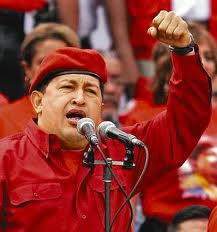 |
|
At the same time, in order to try and reign in inflation the government has been fixing the prices of basic food stuffs. Generally the prices fixed are extremely low, lower than the cost of manufacture, with the natural result that companies stop making or importing these goods. The government then responds by nationalising the companies and the end result is that rather than there being expensive milk, there is now no milk. Our local supermarket has large notices listing the quantities of meat, cheese, sugar, coffee, milk, etc that each family is allowed to buy. A sad state of affairs for such a wealthy country. But much, much sadder is the fact that not withstanding the notice, the shelves have been completely devoid of some of these products for many, many months. |
|
|
There is also, in this energy rich country, insufficient electricity. Electricity and water are cut off for several hours every other day and the two things are inextricably linked. In this hugely oil rich country the vast majority of electricity production is hydroelectric. 70% of total production is produced by the Guri dam alone. Sound a little vulnerable? |
|
|
Add to this, the annual electricity demand has been growing in double figures for many years whilst supply has only been growing at best between 3 and 6% and has most recently, probably been falling - a number of generators are off-line because important routine maintenance has not been carried out - remember all those sacked technicians. Vulnerable isn't perhaps a strong enough word. Then there's massive ongoing deforestation of the Guri catchment area which causes much of the rainfall that previously flowed into the reservoir to run off in other directions. This is caused by illegal mining operations that Chàvez promised to eliminate when he was first elected, but is still in full swing - illegal the mining may be, but it's a big employer of local people and you can be sure that the companies are big contributors to party funds. And then, add the final piece of the jigsaw - a drought! |
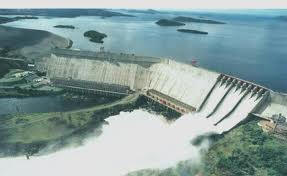 |
|
Now the drought is absolutely not the governments fault (and nor is it, as the Chavistas would have it, due to the USA deliberately tampering with Venezuela's climate), but all the rest is. It's just worth mentioning at this point that the words "The Government" and "Chàvez" are interchangeable for all practical purposes, since virtually all executive actions are the result of a presidential decree. And, as an aside, in the interests of objectivity, it's also fair to say that Venezuelan society and government are highly corrupt and that certainly predates Chàvez' rise to power. I mention this last point as often in Venezuela it's difficult to identify whether a specific issue is a result of corruption or just incompetence. So the drought isn't El Mandante's fault, but giving away $65 billion to other Socialist and/or Latin American countries over the last 5 years to buy political influence - down to him again. Just to confirm that's $65 billion! $13B per year! Roughly a quarter of GDP! Or looked at another way the equivalent of more than doubling the minimum wage in real terms for Venezuelans. And remember, in Venezuela, where so much is nationalised, most workers earn the minimum wage. One could also consider how many power stations you get for $65B! And then, telling his followers that it's OK to steal from the rich. That nobody needs two cars, so if someone has two it's OK to steal one. And other stuff in a similar vein also lays 100% at the feet of President Chàvez. In a country where a huge proportion of the population is poor and doesn't have enough to eat you can imagine the result of pronouncements like that. Caracas for example is now one of the most dangerous cities in the world. More than 250 people are murdered there every weekend. 50% of them are murdered for either their cellphones or their trainers! And I guess one reason why we may seem to care disproportionately much about this, is the last 10 years has turned the Venezuelan coast, which otherwise would be one of the most magnificent cruising grounds in the world, into one of the most dangerous. During our time there we have met numerous boats and sailors that have been attacked and robbed at gun point along the Venezuelan coast - once with fatal results. And these attacks are increasing! |
|
|
Marina Life - OK, enough of that. I feel much better now. On to the Marina, with only the occasional reference to Chavista policies. Marina Bahia Redonda is on the coast between Puerto La Cruz and Lecheria at the entrance to a canal network which is filled with upmarket property developments, a handful of other marinas and a shopping centre. It's called Complejo Turistico El Morro. It's all very nice, and a wonderful dinghy ride to the supermarket, but as a Venezuelan friend said "It's a world within a world, Venezuela's not like this". It is very Venezuelan though in one respect - it's not finished. Bahia Redonda is the most popular marina with foreign yachts. There are a number of reasons for this. Possibly most important in establishing its initial popularity, is it's the first one you see on entering. But aside from that, it's also well protected, but with more breeze and less wash from passing boats than you get further into the canals. And it's part of an apartment complex with a decent swimming pool, etc and surprisingly well run. |
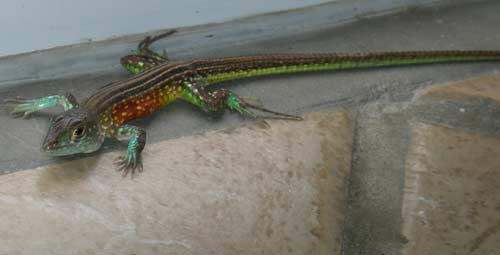 |
| Most important of all, though one fears this is only a matter of
time, it hasn't been nationalised! The other top marina here - Mare
Mare - was nationalised a couple of years back and handed over to the state
tourism department - tourism being according to Chávez
a strategic industry, which should therefore be controlled by the state.
And what happened after
nationalisation - deteriorating service, shabby infrastructure,
surly staff, etc?
All of this is true, but this is Venezuelan nationalisation, so as well as all of the above, there has been an influx of nuevo rich, highly connected Chavistas, who consider it un-socialist to pay their bills, which helps to accelerate the decline. Most important of all, from a cruiser point of view, is that Mare Mare has been closed to foreigners! "But you said it belonged to the state tourist department and tourism was a strategic industry. Aren't foreigners tourists?" Ah-ha, but this is "Tourismo Socialisto", so as a foreigner you only qualify as a tourist if you come from a suitably socialist country, say Cuba for example. "But there are no Cuban tourists. They don't have any money, they certainly don't have cruising boats and anyway they're not allowed to leave the country." Sorry, sliding into political territory again there. However, it leads nicely into the subject of money. Off course there's the official exchange rate....... |
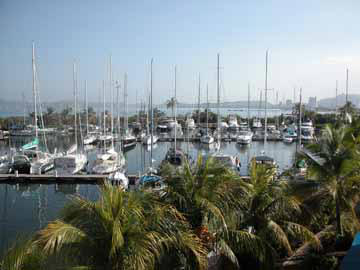 |
Actually there are now two official
rates one for the importation of goods deemed by the government to be
essential and the other for non essential - remember Venezuela imports
almost everything. These rates though are, to a large extent,
academic as even in the best of times the government is only able
to provide about 50% of the dollars that the market needs to pay for
the imports the country needs. (Though of course there are always
enough dollars to pay for Russian tanks, jets, submarines and to
continue making large gifts to other states.) This leads to a thriving
"parallel" market. Notice parallel market not black market.
It's not illegal, because the government recognises that unless the
Bolivar is allowed to float to a realistic rate (politically
unacceptable) the country simply can't function without it. It is
illegal to deal in cash (rather than bank transfer) at the parallel
rate. It's also illegal to publish the rate, though of
course everyone knows what the rate (La Tasa) is. The official
rate (number 1) is about 2.7 Bolivares to the US$ and the parallel rate
when we arrived was around 4:5. By the time we left it was
approaching 10 to 1. What bankers call a spread! At 10:1 Venezuela is cheap! This tumbling of the real value of the Bolivar means there's a hunger for dollars amongst the middle classes or in fact anyone who has any cash. As a gringo it's impossible to visit a dentist, a doctor or any professional without the dollar subject being raised at some point - leading to "Open wide and do you need any Bolivars" type of conversations. On one occasion following one of these conversations our dermatologist arrived at the flat, non-too-steady on his feet, because his socks were stuffed with thousands of bolivar notes.
|
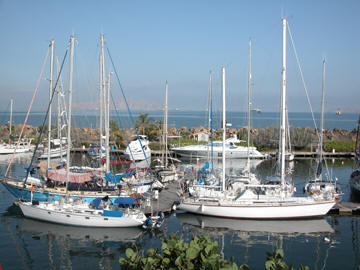 |
||
|
Bahia Redonda has, over the years, become home to a reasonably large number of cruising and no longer cruising boats, though this population is now dwindling because of all the problems discussed above, but primarily because of concerns over security. And those concerns are very real, more real than we probably understood before we made the trip. We now know personally several boats that have been boarded and robbed by armed pirates off the Venezuelan coast during our stay, including the wife of one cruiser who was murdered shortly before we arrived. So the number of visiting boats is much reduced and the marina, which required advance booking only a few years ago, is now roughly half empty. Many of the resident boats have departed, and the ones that are left fall mostly into three categories - desperately trying to get the boat ready to leave, can't afford to leave or live anywhere else, or lack the will to actually leave perhaps because they've become so addicted to being big fish in an increasing small pond that they couldn't possibly fit into any normal society elsewhere. That probably all sounds a bit cynical, but I think it's accurate. None of this means that we didn't meet great people and have some really good times, but it always felt a bit like having a party on board the Titanic when the dance floor was already wet. |
||
|
Selected high spots of our stay there were: The price of diesel. It's US$0.01 per litre. That's not a typo, it's 1 US cent a litre! Actually, that's the price to locals. Gringos aren't allowed to buy it at that price any more - though it is possible. And even if you don't want to make a trip to Cumaná then there's always an enterprising taxista who will deliver it to your boat for 10 cents a litre. One of those rare occasions where one can be absolutely ripped off and not care a bit. The trip by dinghy for a couple of miles through the canals which make up the El Morro (mentioned above). It might sound a bit lame, but it's a really nice experience and even some of the more unrestrained architecture is quite impressive. We won't mention smelly bits with the raw sewage though. |
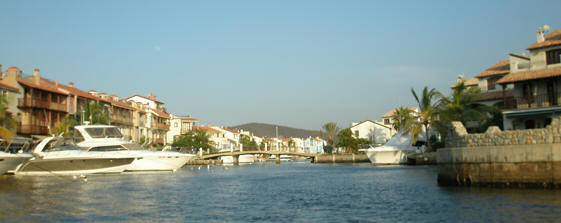 |
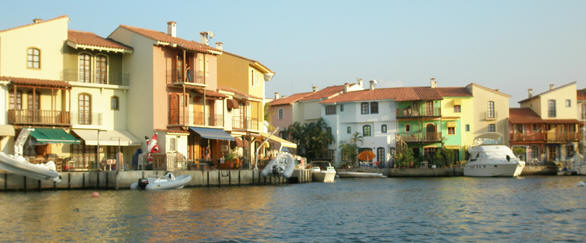 |
Using the pool just about every day that the boat was on the hard - resulting in Barry who, for the first 50 years of life, had the swimming ability of a brick, working up to swimming a mile a day. Lindy could already swim and took up 'noodling'. Some of the social stuff like: Being entertained to a slap up traditional English Sunday lunch at the family seat of the self-styled Lord Sadler of Bahia Redonda (akka Tim & Pauline's flat above the marina). Another, long and rowdy lunch at restaurant El Morroq to celebrate Dave from Amarula's birthday. Sushi at our place - we made so much we were eating it for a week afterwards. Then barbeque nights once the the Americans departed and the French took over the organisation. The start time dropped back from 5.30 towards a more civilised 7.00 and the food improved significantly! |
|
Meeting up with the Brasilian boat Kanaloa, trapped like us in Venezuela for far longer than they ever intended and who were to become great friends and, due to a series of coincidences, cruising partners for some time to come. Going out with Sabine & Olly from Cool Running (in the most unreliable Wrangler Jeep in the world) to the circus, to restaurants, for our farewell to PLC. Drinking enormous quantities of booze, smoking hundreds of cigarettes (correct we don't smoke) and still sitting in a bar outside the ferry terminal to see the sun come up.
And we can't finish without mentioning the unfolding of the great cat & dog debacle. Take one English couple with pedigree cats which are fanatically cosseted as if they were the deities of some strange eastern religion. There is no inconvenience to which human crew will not put themselves to ensure that the ambience of the holy fur-balls is not disturbed. Take one very German couple who have recently become the very proud owners of a slightly hyperactive young poodle, who they talk to (in English) as if he were a bright young human child and discipline (or not) with the same forbearance that proud grandparents do their favourite grandson. Allow the unleashed poodle to sprint up the gangplank to "play" with aforementioned fur-balls - "isn't he sweet". Mix well and sit back to watch developments. These will escalate and escalate, terminating in meetings with the Port Captain, visits to solicitors, restraining orders, eviction from the marina, hospitalization, and more. All watched with increasing bemusement by the local population who hadn't actually needed all this additional confirmation that gringos are generally mad. |
|
The Boat Yard - One of our key reasons for us visiting Venezuela was get the boat painted and we'd met people who were very pleased with the quality of work there and the labour rates were extremely attractive. Well, making no attempt to build up any tension or add any element of mystery, let's start by saying that if we had our time over again we would never, ever, consider having a job like this done in Venezuela ever again. There is no doubt that a few years ago it was possible to have extremely good work done at very reasonable prices. In most cases this is no longer true. There are a number of ??additive?? reasons for this. First, there's the shortage of foreign boats coming here to have work done. At first this must have increased competition, but there are now so few boats, that the best workers, who found it easiest to get jobs elsewhere have done so. We also know that one of the most highly recommended painters left because of fears for the security of his family. We don't know where all these guys went, but they're not there now. And the nature of the extended Hispanic families in this part of the world makes it relatively easy to migrate along the coast to the next country. Everyone has a cousin. In fact someone once remarked that 'the friend of my cousin' is just about the most remote relationship that could exist here. The end result is that the contractors who are left are absolutely not the best. Then add to the mix that because there are so few boats having work done it's difficult to get much in the way of word of mouth recommendation from other sailors. This leaves the primary way of identifying contractors as asking the yards for recommendations. Now you have two elements to consider here. First the yard receives a percentage of the contract value for all work performed in their yard so the most important thing for them is that the work is done in their yard and not someone else's. They therefore have an incentive to recommend the contractor who is likely to offer the lowest price. Lowest price of course does not equate to best quality, but that's academic because as a foreigner you'll be moving on once the work is completed and they're not expecting any repeat business. Even if they'd like to act differently, they really can't, because they have to compete with the other yards who are doing the same thing and times are very hard. And then you need to enter the world of corruption that is the way of life here. "Little Gifts" are the norm, and the contractor who makes the biggest little gifts to the yard operator is also likely to be the most recommendable, irrespective of quality once again. Add those two things together, price forced down to absolute minimum, big overheads in the form of little gifts and it's pretty clear that there isn't much scope for paying top dollars to get the best workers, materials, etc, etc. And then finally and to the equation, that once work is started on a foreign boat you really have very little negotiating power and resources will often be diverted to work on local customer contracts who: a) Are likely to provide repeat business and b) are at the very least likely to be friends of the cousin of the contractor, the yard manager or even a senior Chavista! So, the quality of work is nearly always lower than you would expect in Europe or the USA, sometimes appallingly so and you will need a much higher level of personal supervison than you will expect to do elsewhere. Somebody told us the only way to get a good job done was to buy a case of beer every morning, take it to the yard and sit there drinking it while you watched the workers 100% of the time. It sounded like a smart joke, but we now know it's actually very close to the truth. And then the price - Is it cheap? Well yes labour is cheap (with good reason), but materials are not. If you do plan to get work done in Venezuela you should also plan to bring all the materials with you. Even inflated Caribbean prices will seem cheap compared to local prices. And finally, you need to factor in that the job will almost certainly overrun significantly. I know that always happens, but delays are something that Venezuela truly excels at. Our 1 month paint job took 5! There are always exceptions though and, just in case you are thinking of going there Lee the stainless guy is excellent and José the carpenter can do good work. What both of these guys have in common is that a high percentage of their work comes from outside the boatyard and they both have other premises. To be avoided at all costs is Joel Campo, the painter, and his crew. Joel a dubious mixture of incompetence and dishonesty all wrapped up in the campest of packages. At times it almost seemed that they would go out of their way to a bad job even when it was easier to do a good one. Should you ever visit Bahia Redonda looking to have paint work done, undoubtedly Joel will be strongly recommended to you by Angel, the yard manager - given what you've read above you will draw your own conclusions about him as well!
|
||
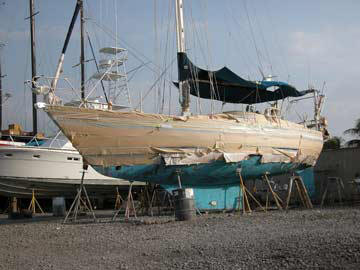 |
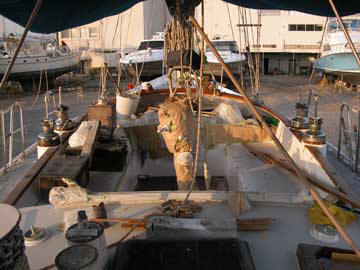 |
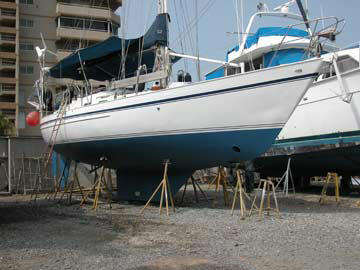 |
|
Leaving PLC - Finally we got the boat back in the water in March 2010, 4 months 9 days since we were lifted. It was a long way from perfect, but it never was going to be and we'd had enough. We would need another two months to get the boat ready for sea and we yearned to be on our way. 'To where' was the question (and will continue to be the question for the foreseeable future). We settled on a plan to sail north to Isla Tortuga for a few days, then north west to the Los Roques archipelago , west to the two Aves groups and then the ABCs - Aruba, Bonaire, Curacao. Hang around there for a bit, finish the varnishing, then Cartegena for Christmas. It was with more trepidation than normal that we prepared for our departure from PLC. We were very concious of the increased levels of piracy and that these generally happened either amongst the inner islands or with 20 miles or so offshore. On our trip here, the advice had always been, don't travel alone, and don't travel at night. For our departure we had no choice but to sail alone and we decided to leave very early in the morning so as to be out of sight of land by first light. So we crept out of the marina in the small hours and breathed bigger and bigger sighs of relief as first the mainland and then the islands dropped out of sight below the horizon. |
